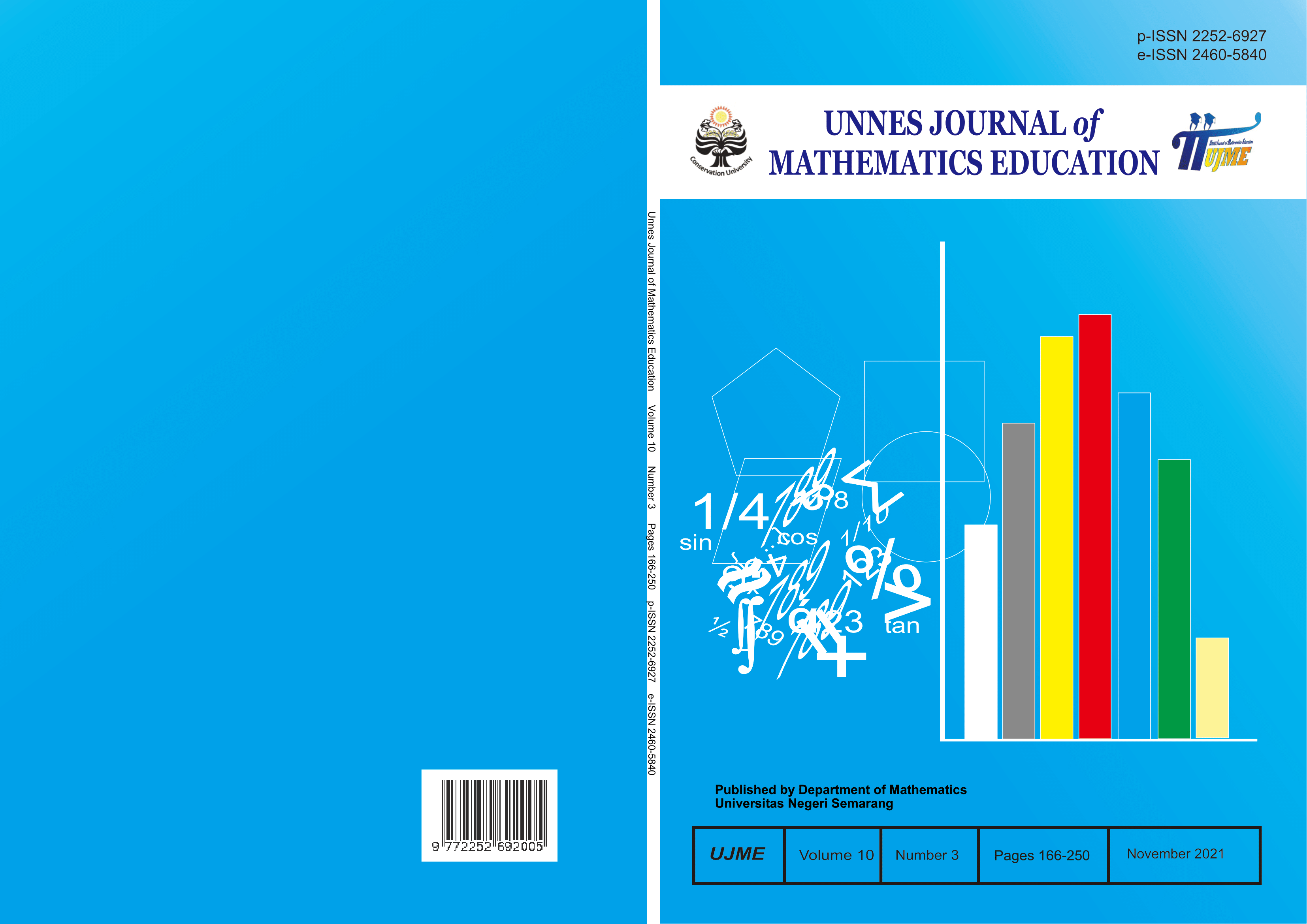Analyzing the Influence of Concept Understanding and Self Efficacy on Student’s Algebraic Thinking Ability in Flipped Classroom Learning Model
##plugins.themes.academic_pro.article.main##
Abstract
The concept understanding and self efficacy are needed in mathematics learning. One of the student’s skills in mathematics learning is the ability to think. The aims of this study is an analyzing the influence of concept understanding and self-efficacy on students' algebraic thinking abilitys and describe the algebraic thinking ability in the flipped classroom learning model based on concept understanding and self efficacy. This research is included in the mix-method research with sequential explanatory design. The results showed that (1) the average concept understanding and algebraic thinking ability of students who were given the flipped classroom learning model achieved learning completeness; (2) the average concept understanding and algebraic thinking ability of students who were given the flipped classroom learning model were better than those given the direct instruction learning model; (3) there is an influence between concept understanding and self-efficacy on students' algebraic thinking ability both simultaneously and partially; (4) i) students who have high concept understanding and high self efficacy tend to have high algebraic thinking ability; ii) students who have high concept understanding and moderate self efficacy than moderate concept understanding and moderate and low self efficacy tend to have moderate algebraic thinking ability; and iii) students who have low concept understanding and self efficacy tend to have low algebraic thinking ability.
##plugins.themes.academic_pro.article.details##
References
Awaluddin. (2018). Pengaruh Self Efficacy dan Self Esteem Terhadap Kemampuan Komunikasi Matematis pada Siswa Kelas VII MTsN 1 Gowa (The effect of Self Efficacy and Self Esteem on Students’ Communication Mathematics Ability on Grade VII MTsN 1 Gowa). (Skripsi). Makassar: UIN Alauddin.
Dewi, Silvana dan M Syahril Harahap. (2019). Efektivitas Model Pembelajaran Flipped Classroom terhadap Kemampuan Penalaran Matematis Siswa. JURNAL MathEdu. (Vol. 2, No. 3, hal 96-102).
Ekawati, E dan Sumaryanta. (2011). Pengembangan Instrumen Penilaian Pembelajaran Matematika SD/SMP. Pusat Pengembangan dan Pemberdayaan Pendidik dan Tenaga Kependidikan Matematika.
Kieran, C. (2004). Algebraic Thinking in Early Grades: What Is It ?. The Mathematics Educator 2004. Vol. 8. No. 1. Hal 139-151.
Maolidah, I. S., dkk. (2017). Efektivitas Penerapan Model Pembelajaran Flipped Classroom pada Peningkatan Kemampuan Berpikir Kritis Siswa. Educational Technologia. (Vol. 3, No. 2, hal 5).
Mashuri., Wijayanti, K., Veronica, R. B., Isnarto, I. (2018). Keberlakuan Teorema pada Beberapa Struktur Aljabar. Prosding Seminar Nasional Matematika 1, 928-935.
Novitasari, D. (2016). Pengaruh Penggunaan Multimedia Interaktif Terhadap Kemampuan Pemahaman Konsep Matematis Siswa. FIBONACCI Jurnal Pendidikan Matematika & Matematika. (Vol. 2, No. 2, hal 8-18).
OECD. (2019). Programme for International Student Assessment (PISA) Results from PISA 2018.https://www.google.com/url?sa=t&source=web&rct=j&url=https://www.oecd.org/pisa/publications/PISA2018_CN_IDN.pdf&ved=2ahUKEwjjm-PP_dfvAhWSeX0KHfQ2AEYQFjAUegQICBAC&usg=AOvVaw0LstVlsQl5Neve2bttPxMG.
Permendiknas Nomor 22 Tahun 2006 Tentang Standar Isi Mata Pelajaran Matematika (Decree of The Indonesian Minister of Education Number 22, 2006)
Pranata, Ella. 2016. Implementasi Model Pembelajaran Group Investigation (GI) Berbantuan Alat Peraga untuk Meningkatkan Kemampuan Pemahaman Konsep Matematika. Jurnal Pendidikan Matematika Indonesia. Vol. 1. No. 1. Hal 34-38.
Silviani, S. A., Mashuri., Wijayanti, K. (2020). Algebraic Thinking Ability of VIIth Grade Students in Mathematics Using SAVI Learning Model. Unnes Journal of Mathematics Education, 9 (2) hal 154-159.
Sugiyono. (2016). Metode Penelitian Pendidikan Pendekatan Kuantitatif, Kualitatif, dan R&D. Bandung: Alfabeta.
Undang-Undang Republik Indonesia Nomor 20 Tahun 2003 Tentang Sistem Pendidikan Nasional (Act of The Republic of Indonesia Number 20, 2003).
Wardani, S, & Rumiati. (2011). Instrumen Penilaian Hasil Belajar Matematika SMP: Belajar dari TIMSS dan PISA. Kementrian Pendidikan Nasional Badan Pengembangan Sumber Daya Manusia (PPPPTK) matematika.
Wijaya, Y., Sudjimat, D. A., dan Nyoto. (2016). Transformasi Pendidikan Abad 21 sebagai Tuntutan Sumber Daya Manusia di Era Global Estetika. Jurnal Pendidikan Matematika. 1(2), hal 263-278.
